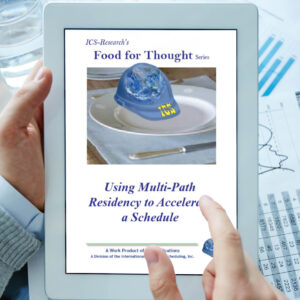Showing 25–32 of 37 results
-

$3.99
Cognitive Project Management calls for a Project START Summit to be held during the first week following Contract Award. Beyond the obvious b benefit of team-building, the Summit allows the Project Team to take important decisions that require early consensus, decisions that directly affect Project Execution.
The Summit would be hosted and chaired by the General Contractor, and attended by members of all of the primary organizations participating in the Project, including Owner, Architect, Engineers, Construction Manager, Owner’s Representative, General Contractor, as well as key subcontractors, suppliers, and consultants.
-

$5.99
You would think that the Project Schedule is meant to help coordinate the work of the Project Team. But that’s not its primary purpose, according to Dominant Project Management. To them, the Project Schedule is used to predict future outcomes: e.g., project completion; cost-to-complete; temporal overrun projections, etc.
This article calls for a return to common sense. Without the orchestration of a well-coordinated effort, Project success is left essentially to chance. A fully-effective Project Schedule should be designed to facilitate Project Coordination — by facilitating Understanding and Communication.
-

$4.99
Most Project Managers and Professional Schedulers misunderstand the true nature of Free Float. Blame for this misunderstanding goes to Dominant Project Management literature which consistently defines Free Float as a time gap between two activities. Given this flawed understanding, there seems to be little practical use of the Free Float value.
The truth is that Free Float is the time gap between an entire Path Segment and a subsequent activity. Understanding this, Free Float can be a very useful piece of information when deciding where to deploy resources on a Project. You can squeeze a lot more productivity out of labor, instance, by having them work smarter, not harder.
-

$3.99
ICS-Research has developed an innovative process to help Project Managers determine how to accelerate a Project Schedule, or to maximize resource utilization on a Project. And it really works!
This article explains how to us Multi-Path Analysis to identify the best place to deploy additional resources in order to provide the overall Schedule with the most temporal benefit.
-

$4.99
In the Critical Path Method (CPM), Activities that occur somewhat concurrently are referred to as Overlapping Activities. The temporal extent to which they are not entirely concurrent is expressed in terms of what are referred to as “leads” or “lags.” As simple as this concept is to understand, Project Management literature is surprisingly conflicted as to the difference in meaning of the two terms.
This article, from the minds at ICS-Research, clears up the confusion, suggesting “stipulations” as to whether the stagger between Activities reflects Work Performance or mere Passage of Time. This is a must-read article for anyone who builds schedules using the Critical Path Method.
-

$3.99
During Baseline Schedule development, there is a need to “make it fit” between any contractual milestones. It is not uncommon for the Project Team to twist and contort the Schedule’s logic in order to “meet the deadlines.” Likewise, during Project Execution, should the Project ever fall behind schedule, the tendency is to manipulate Schedule logic in order to achieve “acceleration” or “recovery.”
This article reminds us that any time we ignore or dismiss well-contemplated and fully-justified Schedule Logic and Activity Durations, we erode the credibility of the Project Schedule.
-

$3.99
According to the Online Dictionary, a strategy is “a plan, method, or series of maneuvers or stratagems for obtaining a specific goal or result.” That is all well and fine, but when it comes to Construction Project Time Management, it is questionable whether that definition helps all that much.
Since a strategy is aimed at pursuit of an objective or goal, a strategy must therefore reflect held Values. This article shines a light on a major challenge to creating a single Project Schedule : A Project Schedule is a strategy for successful project achievement. Yet, “success” is defined differently by different contributors. Project Players typically work at cross-purposes to one another. How then can a unified understanding of “success” prevail?
-

$4.49
The title question might seem innocent enough, maybe even unnecessary. But, as this article explores in a fair amount of detail, Project Planning and Project Scheduling are two separate exercises. Taken together, these two exercises should reflect the intentions and commitments of the Project Team as to how they intend to execute the actual work performance of the Project.
According to this article, a Project Execution Plan is not the same as a Project Management Plan, as called for by Dominant Project Management dogma. Yet, the Project Execution Schedule, which is typically fairly detailed (and should be based on a previously developed Project Execution Plan, cannot itself include the Project Execution Plan, as Dominant Project Management insists.
End of content
End of content








